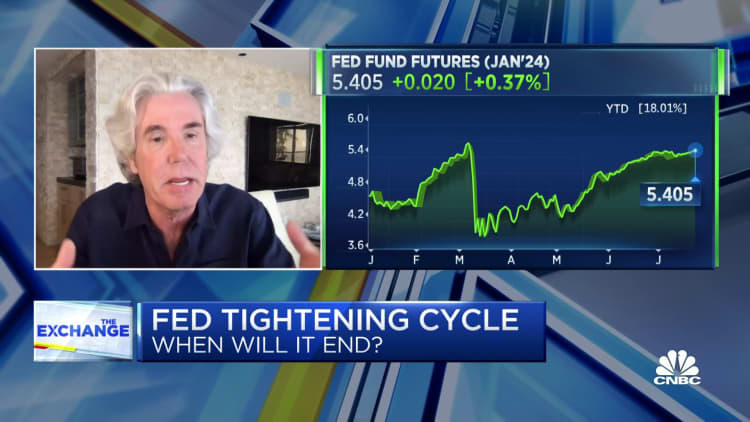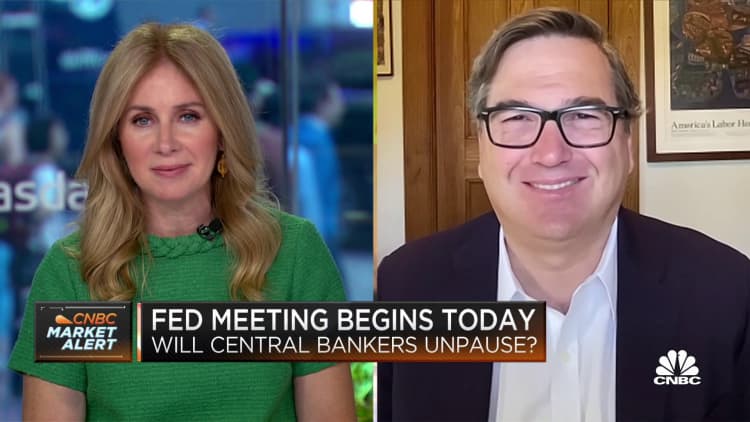Here’s what to expect from the Federal Reserve meeting Wednesday
WASHINGTON, DC – JUNE 21: Federal Reserve Chairman Jerome Powell testifies before the House Committee on Financial Services June 21, 2023 in Washington, D.C. Powell testified on the Federal Reserve’s Semi-Annual Monetary Policy Report during the hearing.
Win Mcnamee | Getty Images News | Getty Images
Despite an improving inflation picture, the Federal Reserve is expected on Wednesday to approve what would be the 11th interest rate increase since March 2022.
Investors are hoping it will be the last one for a long time.
Markets are pricing in an absolute certainty that the Fed will approve a quarter percentage point hike that will take its benchmark borrowing rate to a target range of 5.25%-5.5%. That would push the upper boundary of the federal funds rate to its highest level since January 2001.
The more pressing matter will be whether Federal Open Market Committee officials feel they’ve gone far enough or if there’s still more work to do in the fight against pernicious inflation.
“The signal will probably be, yes, we’re hiking, but then we think we can sit here for a while and see,” said Kathy Jones, chief fixed income strategist at Charles Schwab. “But no promises. They can’t give up the option.”
Indeed, the Fed’s course is far less certain. Central bank policymakers almost unanimously believe inflation is too high, but hiking more from here carries risks to an economy that many think is heading for at least a mild recession.
‘The Fed should be done’
Jones is part of a growing market chorus that thinks the central bank has gone far enough. With the annual inflation rate declining to 3% in June — it was 9.1% a year ago — the danger is growing that the Fed could unnecessarily push the economy into contraction.
“The Fed should be done already,” Jones said. “They’re walking a difficult line here. To me, the decision would be, hey, we’ve done enough for now, and we can wait and see. But apparently the folks at the Fed think they need one more at least.”
In fact, Fed officials indicated strongly at their last meeting — the first one during this tightening cycle that didn’t see a rate increase — that they see at least two more hikes this year.
Since that meeting, policymakers have done little to dispel the likelihood of higher rates.

Markets, though, haven’t seemed to mind. Wall Street has been on a tear all year, with the Dow Jones Industrial Average jumping more than 5% over the past month alone. That could be because traders are ignoring the Fed’s rhetoric and pricing in just a 35% probability of another hike before the end of the year, according to CME Group’s FedWatch gauge of futures market pricing.
One key from the meeting will be whether Fed Chairman Jerome Powell indicates that, at the least, the FOMC will again skip a hike at its next meeting in September while it analyzes the impact the previous increases have had on the economy. Powell has said the Fed is not locked in to an every-other-meeting pattern of hikes, but he has indicated that a slower pace of hikes is likely.
“The hike that’s going to happen [Wednesday] is unnecessary, and probably the last couple were unnecessary,” said Luke Tilley, chief economist at Wilmington Trust Investment Advisors. “By the time we get to November, that’ll be even clearer.”
Repeating history
Fed policy, though, has been informed by a belief that when it comes to fighting inflation, it’s better to do too much than too little. The current bout of price increases was the most severe the U.S., and many other developed nations, has had to face since the early 1980s.
That last period also is behind a lot of the Fed thinking, with a particular focus on how policymakers then backed off the inflation fight too soon and ended up having an even worse problem.
“It’s easy for me to say that I think they’re going too much,” Tilley said. “But I’m also quick to say that if I was in their seats, I might be doing the same thing, because they really are playing a game of risk management.”
That game is familiar by now: Retreating from the inflation fight soon could lead to a repeat of the 1970s-early 1980s stagflation of high prices and weak growth, while going too far risks tipping the country into a recession.
Recent indicators are showing that credit conditions are tightening significantly, with higher interest rates and tougher lending standards substantial headwinds to future growth.
“Recently softer core inflation will be welcomed by Powell, but he is likely to want several more months of softer inflation data before confidently terminating the hiking cycle,” Citigroup economist Andrew Hollenhorst said in a client note. “In our view the U.S. economy is not headed toward a soft landing. After a summer of projected softer core inflation data, we see upside inflation risks reemerging in the fall.”
Likewise, Steven Blitz, chief U.S. economist at Globaldata.TSLombard, said a “dovish hike and talk of soft landings” at Wednesday’s meeting would be a mistake for the Fed.
“Planes land, economies do not. Economies are an ongoing dynamic process, and no recession will prove more problematic for the Fed than not,” Blitz wrote. “The economy is heading into recession, but if it is somehow avoided, then the disinflation of this moment will prove fleeting, so too the Fed’s confidence that they are at the end of this hiking cycle.”

For all the latest World News Click Here
For the latest news and updates, follow us on Google News.

